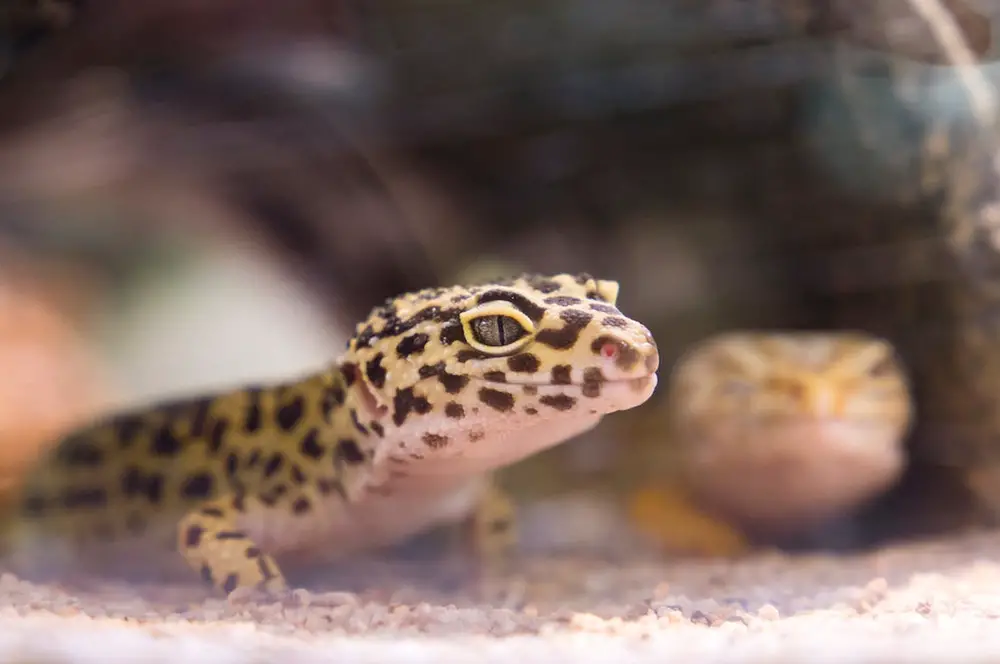Leopard geckos are fascinating creatures with unmistakable polka-dotted bodies and funny little faces. They are so adorable that they’re extremely popular with reptile enthusiasts and casual fans alike, but are Leopard geckos intelligent?
Studies indicate that the leopard gecko operates more on instinct and, therefore, would not be considered ‘intelligent’ by a human metric. According to Nature.com, intelligence can be defined as a creature’s ability to adapt, while instinct is the behavior that is inherent to its nature.
Still, those same studies have also shown that there may be more to these small reptiles than meets the eye—read on to learn more!

Assessing the Intelligence of a Leopard Gecko: Intelligence vs. Instinct
Leopard geckos—scientifically, Eublepharis macularius—received their common English name due to their brown-spotted sandy skin that resembles the pelt of their feline namesake.
They can make charming pets, as they’re generally docile, have relatively low maintenance needs, and of course, their adorable little faces often look inquisitive and friendly. In terms of intelligence, there’s something of a question mark. Leopard geckos are instinctive creatures, but not necessarily intelligent. While they can be related, ultimately, there is a marked difference between the two concepts.
To understand the difference between intelligence and instinctive behavior, we can use the following example.
Think about a bird building a nest, laying eggs in it, and then incubating those eggs. This behavior would be considered instinctive, as most bird species do this. But an example of intelligence would be an individual bird building their nest in a cliffside niche, the eggs fall out, and the bird figures out that perhaps that location is not ideal for egg laying. The bird understands the problem and adapts by building elsewhere. This is a demonstration of intelligence.
Leopard geckos don’t often adapt in the face of adversity. Instinctively, they know that they need to keep warm, males can identify females that are ready to breed, and females know they need to dig a nest for eggs. But should a leopard gecko tumble off of a log or ledge in their enclosure multiple times, they are not necessarily likely to learn to adjust their behavior accordingly.
The repetition does not teach them to adapt. So, we can conclude that by the most basic definition of intelligence, leopard geckos live more by instinct.
Leopard Geckos Can Regenerate Brain Cells
A 2018 study indicates that leopard geckos can regenerate brain cells. While this is not indicative of heightened intelligence, it is nonetheless valuable knowledge.
Given that we know that geckos can regrow their tails if they lose them, perhaps it’s not very surprising to find out that they can regenerate other things as well. In the case of the brain cells, this is useful to the gecko, especially if they suffer any brain injury. The constantly regenerating brain cells may help them recover more quickly.
Humans aren’t as efficient at regenerating brain cells, so scientists hope that continued study of the leopard gecko’s unusual abilities can aid in finding breakthroughs in human neuroscience. Surprisingly, reptile brains bear a closer resemblance to mammals than to fish or amphibians. This could help neuroscientists figure out methodologies to teach the human brain to regenerate brain cells in more productive ways.
Can Leopard Geckos Learn Tricks?
As we’ve learned, leopard geckos may not be extremely high on the intelligence scale. That said, while largely driven by instinct, leopard geckos are capable of learning a few entertaining behaviors that could be considered ‘tricks.’ Teaching these behaviors requires a great deal of time and patience—remember that you’re dealing with a small creature who sees you as a terrifying giant! Your spotty little friend will need to be comfortable with you and with being handled.
In fact, acceptance of handling will be the first and most crucial ‘trick’ you teach your leopard gecko. Typically, these little creatures do not enjoy being handled, but they can be gently and gradually taught to become accustomed to it. This will be a big step in your bonding and trust-establishing process, so be sure you don’t skip it. Reptile specialist Audra Barrios offers many tips for working with your leopard gecko via WikiHow (see link below in sources).
Also, check out a great video below to get started with the basics of just learning how to handle your Leopard Gecko.
Once your gecko trusts you, you can move on to more complicated tasks. They have poor depth perception, so they’re not very good hunters. But you can use a combination of signal noises and feeding tongs to help teach them to ‘chase’ a treat. With enough repetition, this will become a fun game for both of you, and the gecko gets a workout, which is beneficial, since their favorite snack, waxworms, can be quite fatty, and geckos are not immune to weight gain.
Other ‘tricks’ your gecko may be able to learn include:
- Responding when they are called
- Running an obstacle course
- Walking on a leash
- Potty training
With time, patience, and trust, you can win hours of mutual entertainment with your pet.
Are There Benefits in Training Leopard Geckos?
Pet leopard geckos, like all companion animals, can greatly benefit from daily enrichment. It keeps them active mentally and physically and can help prevent the onset of issues like obesity or depression.
Plus, the more time you spend with your gecko, the stronger your bond will become. Since you’re their reliable food source and caretaker, that sort of trust is important and rewarding for both of you.
Final Thoughts
What we can take away today is that while leopard geckos do not meet the most basic metric for determining intelligence, they are still rather clever. And yes, they can learn some ‘trick’ behaviors. Not to mention that studying them may also provide a great deal of new information that can be applied to human neuroscience. That’s no small thing!
Hopefully, you will now regard your polka-dotted buddy in a brand-new light. Have fun and happy training!
Lastly, just for fun, here’s a funny video that pokes a little fun at this topic. Enjoy!
Sources
Nature.com
Wikipedia.org
Petgeckos.com: The Pros And Cons of Geckos As Pets By Species
Upi.com/Science News
Sciencedaily.com
Critterowner.com
Reptileroom.net: Are Leopard Geckos Smart or Dumb?
Wikihow.com: Have Fun With Your Leopard Gecko
